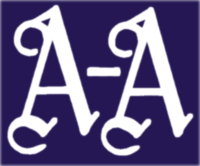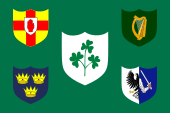Anti-Assassins
 | ||
| Unions | Rugby Football Union | |
|---|---|---|
| Founded | 1950 | |
| ||
The Anti-Assassins Rugby Union Football team (A-As) was an invitation team that selected players from the northern counties of England to play friendly charitable matches locally and to go on tour. The team was remodelled in 2004, teaming up with the Wooden Spoon Society (another charitable rugby organisation) to become the Spoon AAs.
The Spoon AAs rugby team continues to play a mixture of traditional fixtures with matches against the Old Boys teams from Sedbergh, Kirkham, Giggleswick and Stonyhurst. Special matches against clubs in the North and other parts of the country are arranged to celebrate Anniversaries and openings etc. The team has recently travelled to Cambridge University, Richmond and Taunton, they have played against the Royal Navy and a British Army team based in Germany, as well as a variety of Sevens tournaments.
Semper Mores Boni, Latin for "good behaviour always", is the motto of the club.
History
The Anti-Assassins was founded in 1950 when three Old Sedberghians, Stewart Faulds, Geoff and Arthur Kenyon, were invited to pick a Northern team to play against the masters and Old Boys (The Assassins) of Sedbergh School, Cumbria. This invitation team carried on playing a variety of fixtures, mainly in the North, raising money for established charities, celebrating special club occasions and helping to develop rugby football at leading schools.
Opponents
The A-As have played many clubs locally in the north of England, they have conducted tours within Europe (to Galway, Isle of Man, Jersey, Ulster, France, the Netherlands, Italy and Spain) and have been further afield to play matches and 7's tournaments in Australia, Canada, Dubai, East Africa, South Africa, USA and the Caribbean. The A-As were a regular fixture at the Glengarth Sevens at Davenport Rugby Club (now Stockport R.U.F.C) and won the Davenport plate in 1978.
East Africa tours
1964
The first tour to East Africa by the Anti-Assassins took place in 1964 (one source states 1965[a]).
| Date | Opposition | Location | Result | Score |
|---|---|---|---|---|
| 1964- - | Scorpions RFC | RFUEA ground, Nairobi | lost | - |
| 1964- - [a] | East Africa | RFUEA ground, Nairobi | won | 0 - 13 |
1969
The second Anti-Assassins tour to East Africa occurred five years later. (In the intervening years East Africa had played against the Anti-Assassins on their "Third Tuskers Tour" to England in 1966; on this tour East Africa had also played against Richmond F.C., Blackheath F.C., Wilmslow RFC, Vale of Lune RUFC, Harlequin F.C. and Fylde, losing all their matches).
Stewart Faulds, the founder of the Anti-Assassins, was the 1969 tour manager and in an interview for Rugby World magazine[2] he stated that despite the scorelines, the matches were not as one sided as they may appear on paper; it was not until the end of the second half in many of the matches that the visitors took control. He also stated that the RFUEA's administration and organisation could not be bettered anywhere and suggested that any club that could undertake a similar tour would be ensured a trip of a lifetime.
The matches were very popular attracting crowds never fewer than 1,500 spectators and the last match of the tour against East Africa was watched by nearly 4,000 people.
The player of the tour was the Rugby School former pupil Bill Hartley (Headingley and Yorkshire) who scored 22 tries in seven matches playing on the wing. Another standout player was the flanker Stan Purdy (Warwickshire and England). The team was captained by WM (Bill) Patterson (Sale FC, Cheshire, England and Lions) who suffered a concussion in the last game and was replaced by Malcolm Philips (Oxford University and England).
| Date | Opposition | Location | Result | Score |
|---|---|---|---|---|
| 1969- - | | Kampala | won | 14 - 37 |
| 1969- - | West Kenya Province | Kitale | won | 18 - 60 |
| 1969- - | Kenya Clubs | Nakuru | won | 3 - 28 |
| 1969- - | Central Province (Kenya) | Nairobi | won | 15 - 25 |
| 1969- - | Scorpions RFC | RFUEA ground, Nairobi | won | 14 - 48 |
| 1969- - | | Dar es Salaam | won | 8 - 30 |
| 1969- - | Coast Province | Mombasa | won | 6 - 50 |
| 1969- - | East Africa | RFUEA ground, Nairobi | won | 8 - 40 |
1982
The third East Africa tour was conducted in 1982, though strictly it was a tour of Kenya rather than the whole of East Africa. By playing Kenya on this tour they achieved feat perhaps unrivalled by any club, that of having played all three East African nations (Kenya, Tanzania and Uganda) and the East African multinational side.
| Date | Opposition | Location | Result | Score |
|---|---|---|---|---|
| 1982-05-22 | Scorpions RFC | RFUEA ground, Nairobi | - | |
| 1982-05-25 | West Kenya Province | Nakuru | - | |
| 1982-05-27 | Nondescripts RFC | Parklands Sports Club, Nairobi | - | |
| 1982-05-29 | Chairman's XV | RFUEA ground, Nairobi | - | |
| 1982-06-02 | Mombasa RFC | Mombasa Sports Club, Mombasa | - | |
| 1982-06-05 | | RFUEA ground, Nairobi | - |
1982 Tour party
- J Fisher - Tour manager (Fylde and Cambridge University)
- B Fryer - Baggage master (Belfast RFC, Bury RFC and Lancashire)
- J Gardiner - Captain (Wilsmslow RFC, Sale FC and Cheshire)
- F MacLoughlin (Northern RFC, Connacht, Northumberland, Ireland and Lions)
- R Birtwistle (Fylde and Yorkshire)
- M Featherstone (Waterloo R.F.C.)
- J Webster (Wilmslow RFC and Cheshire)
- L Aspden (Orrell R.U.F.C.)
- J Heaton (Orrell R.U.F.C., Wigan RFC and Chester RUFC)
- P Philpot (Headingley FC and Yorkshire 'B')
- K Garnett (Fylde and Cumbria)
- R Samuels (Waterloo R.F.C. and Surrey)
- M Weir (Fylde and Lancashire)
- G Smith (Headingley FC and Yorkshire)
- D Fisher (Fylde and Scottish Universities)
- N Leeming (Fylde)
- P Southern (Wasps FC)
- A Machell (Headingley FC and Yorkshire)
- S Hartley (Broughton Park RUFC and Staffordshire)
- D Cleary (Orrell R.U.F.C.)
- S Christopherson (Waterloo R.F.C. and Lancashire)
- M Wright (Otley RFC and Yorkshire)
- M Leach (Waterloo R.F.C. and Wales 'B'
- D Williams (Orrell R.U.F.C.)
- P Simpson (Gosforth RFC, Northumberland and Barbarian FC)
- G Stewart (Manchester RFC)
- N Spaven (Sale FC and Lancashire)
- S Bernard
- A Laycock [Cambridge University and Headingley FC]
- A Moran
- S Burgess
Notable players
An invitation to represent the A-As has delighted many players, be they just good club men or seasoned Internationals, over the last six decades. Amongst the legion of distinguished players to wear the jersey are:
- Stuart Lancaster
- Bill Calcraft
 Australia
Australia - Mark Ella
 Australia
Australia - Ian McGeechan
 Scotland
Scotland - John O'Driscoll
 Ireland
Ireland - John Spencer
 England
England - Peter Stagg
 Scotland
Scotland - David Strettle
 England
England - Peter Winterbottom
 England
England - Feidlim MacLoughlin
 Ireland and British Lions
Ireland and British Lions - Paul Simpson Barbarian FC
- Martin Whitcombe
- Paul Turner
Members
The Wooden Spoon Anti-Assassins’ membership now includes over 100 internationals and four Past Presidents of the RFU. Bill Beaumont, the Lions Manager in New Zealand in 2005 and recently appointed Vice Chairman of the iRB is one of our members. Malcolm Phillips, President of the RFU in 2005-2006 is the new Wooden Spoon A-As’ President.
Notes
a. ^ One source[3] claims that Anti-Assassins beat East Africa 13 -0 in 1965 whilst another claims that Anti-Assassins toured East Africa in 1964. It is assumed that the 1964 date is correct and that the 13- 0 defeat of East Africa took place on that tour.